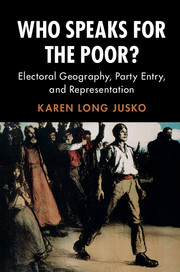Book contents
- Frontmatter
- Dedication
- Epigraph
- Contents
- List of Figures
- List of Tables
- Preface and Acknowledgments
- 1 Who Speaks for the Poor?
- 2 How Electoral Geography Matters
- 3 New Parties and the Changing Electoral Geography of Contemporary Democracies, 1880–2000
- 4 The Populists and “Third-Party Men” in America
- 5 Strategic Entry of the CCF and Social Credit in Canada
- 6 The Implications of Electoral Geography for British Labour
- 7 The Swedish Social Democratic Party, and the Long-Term Implications of Electoral Reform
- 8 “It Didn't Happen Here”: The General Implications of Electoral Geography for the Political Representation of the Poor
- References
- Index
- Miscellaneous Endmatter
6 - The Implications of Electoral Geography for British Labour
Published online by Cambridge University Press: 05 September 2017
- Frontmatter
- Dedication
- Epigraph
- Contents
- List of Figures
- List of Tables
- Preface and Acknowledgments
- 1 Who Speaks for the Poor?
- 2 How Electoral Geography Matters
- 3 New Parties and the Changing Electoral Geography of Contemporary Democracies, 1880–2000
- 4 The Populists and “Third-Party Men” in America
- 5 Strategic Entry of the CCF and Social Credit in Canada
- 6 The Implications of Electoral Geography for British Labour
- 7 The Swedish Social Democratic Party, and the Long-Term Implications of Electoral Reform
- 8 “It Didn't Happen Here”: The General Implications of Electoral Geography for the Political Representation of the Poor
- References
- Index
- Miscellaneous Endmatter
Summary
The case of British Labour might seem quite different from the American and Canadian parties. To the extent that opportunities in subnational governments structure the incentives of political entrepreneurs and encourage the formation of regional parties, for example (see Chhibber & Kollman 2004), party entry in Great Britain, a unitary state, ought to reflect different (at least moderated) incentive structures. Further, one might expect the importance of the presidency to structure American party formation incentives quite differently from the incentives of British political entrepreneurs, who can focus exclusively on the legislature. This chapter will show, however, that the early leaders of British Labour structured their decisions in ways that were similar to the decisions of political entrepreneurs in Canada and the US. They recognized opportunities for entry in districts where the composition of voters had changed dramatically, and in ways that favored low-income citizens. And, they crafted a platform that reflected the interests of these newly pivotal voters – although these voters were predominantly industrial workers, rather than agricultural. Finally, they entered those electoral contests in which low-income voters were likely to be pivotal, and especially where large numbers of migrants were concentrated.
The main contribution of this chapter, therefore, lies in the demonstration of the importance of changing electoral geography in the origins of parties that represent, primarily, the interests of industrial low-income voters. If cross-national variance in the quality of political responsiveness to poverty can be attributed to the historical dominance of left parties (the “Power Resources” account; see Huber & Stephens 2001), then understanding the implications of early electoral geography for the formation and entry of social democratic and labor parties is a crucial part of this explanation. Further evidence in support of this argument will be presented in Chapter 7, which examines the entry of the Swedish Social Democrats, as well as the implications of electoral reform. Here, I focus on the changing electoral geography of Britain between 1881 and 1906, and show how it is different from the electoral geography of the US in the same period, and Canada in the 1920s and 1930s, but that the political entrepreneurs – the “third-party men” – faced similar opportunities for the formation and entry of a new party.
- Type
- Chapter
- Information
- Who Speaks for the Poor?Electoral Geography, Party Entry, and Representation, pp. 105 - 126Publisher: Cambridge University PressPrint publication year: 2017



